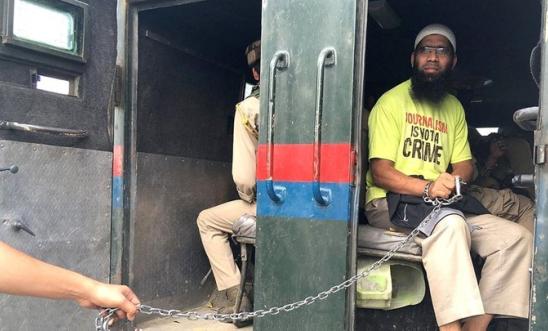
The Long Reach of the Indian Government

This blog was written by Cherry Bird, Country Coordinator for India.
In the period just before the fourth anniversary of the revocation of article 370, which deprived Kashmir of its status as India’s only Muslim majority state, downgrading it to two Union Territories ruled directly from Delhi, Kashmiri activists noticed a significant increase in levels of harassment. Anyone involved in journalism and the media, or any form of activism that overtly or covertly criticises the Indian government, is used to experiencing harassment if they step beyond some defined line, perhaps because they have written a critical piece for a journal or posted on social media, or chaired or been part of a meeting discussing “sensitive” issues. Often this begins with “warnings”, such as phone calls from people purporting to be members of the BJP governing party but not identifying themselves, or vague posts on social media spreading rumours about their professional competence or morals (used especially in the case of women activists). It is an interesting indication of human adaptability and bravery, that these activists have learned to assess how far they can push the envelope without attracting more serious consequences, rather like playing ping pong with a tiger.
This time however, there were no warnings. In the space of a few weeks 98 journalists had their passports suspended and a number had their houses or offices raided by the authorities. Others were rounded up and held for questioning at police stations. Even those based in UK or US who travel regularly to India and/ or Kashmir experienced various measures – a common one being suspension of the visa free access granted to Indians settled in foreign countries, enabling them to easily move back and forth to visit relatives or carry out business.
A number of high profile Kashmiri journalists are currently languishing in jail because the Indian government views them as a serious threat. They include Asif Sultan (see photo), arrested in 2018 after he wrote an article about militants. Fahad Shah, who edited a digital magazine, arrested in February 2022, accused of "propagating terror" and freelance journalist Sajad Gul arrested a month earlier, soon after he posted a video on social media showing locals shouting anti-India slogans. Khurram Parvez, the co-founder of Jammu and Kashmir Coalition of Civil Society (JKCCS), which has done enormous amounts of human rights work in Kashmir, has been in jail since November 2018.
The latest journalist arrest was in March this year. Irfan Meraj, whose work has appeared in international outlets, is accused of having links with terrorist funding, in a case that that alleges NGOs, including JKCCS, received funds from extremist organisations through illegal means. In August Parvez Imroz’s house was raided by the National Investigation Agency (NIA) and his mobile phone confiscated, linked with the same case. He has been summoned to appear before the NIA, which often leads to detention, so he is at imminent risk.
In each of these cases, the NIA has invoked the Unlawful Activities (Prevention) Act – India’s primary counter-terrorism law, which enables them to detain people indefinitely and to refuse bail. A recent BBC World service report on Kashmir (read here) highlighted the increasing lack of media freedom, following a year-long investigation of accusations that the Indian government is running a systematic campaign to intimidate and silence the press in the region. The journalists they spoke to all see the government's actions against other journalists as a warning to them and only agreed to meet anonymously and in secret, for fear of reprisals.
With elections next year and the fifth anniversary of the revocation of article 370 in August, the widespread expectation is that things will get worse. It also is very clear the US and other western powers are not willing to criticise India as it is too useful as a bridge with Russia and a huge potential market for much needed trade agreements.
If you are interested in supporting, or just learning more about Amnesty’s Activist Led Campaign on Kashmir, you can contact us on kashmircampaign@amnesty.org.uk to join the supporter network and receive regular updates.
Our blogs are written by Amnesty International staff, volunteers and other interested individuals, to encourage debate around human rights issues. They do not necessarily represent the views of Amnesty International.
0 comments